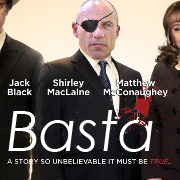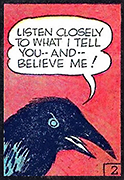(Thread IKs:
skooma512)
|
HashtagGirlboss posted:I don’t need to hear about your oral sex routine buddy haha your gay
|
|
|
|

|
| # ? May 24, 2024 21:00 |
|
gradenko_2000 posted:Weren't people taught how to write in school? you'd be surprised
|
|
|
|
gradenko_2000 posted:Weren't people taught how to write in school? This is what I keep saying. I think, no offence to my esteemed posting colleagues, a lot of this is computer touchers thinking analytical work is beep boop arranging sentences and not about the actual thought behind those sentences. Beyond that, I would guess they think the the trivium and quadrivium are easier than computer science or something? People who can neither read nor write devalue the work of those that do because they don't understand it. This is the classic tech guy "disruption" mentality. Even emails and routine correspondence are supposed to communicating ideas, and since AI can neither have the ideas nor communicate them, you can't automate these tasks.
|
|
|
|
Captain Ironblood posted:I work in compliance in a large company and I put Grammarly on the banned list because it's essentially just a keylogger, not to mention the AI training issue. The spell check enabled in most apps and browsers by default does the same poo poo. Google also uses their spell check for targeted ads.
|
|
|
|
Frosted Flake posted:trivium and quadrivium hadnt heard of this until a few months ago, western education system ftw
|
|
|
|
Frosted Flake posted:This is what I keep saying. most of the people trying to communicate these ideas are loving stupid it's a lot easier to automate these tasks then you think
|
|
|
|
Rectal Death Alert posted:most of the people trying to communicate these ideas are loving stupid it's a lot easier to automate these tasks then you think you say that but all the current automation sucks rear end at it
|
|
|
|
Beginning to wonder if switching to compensating upper management primarily through stock options in the 90s was a national security disaster *looks over at number being up* yeah gently caress yeah! goal! score team America right there
|
|
|
|
the milk machine posted:you say that but all the current automation sucks rear end at it yeah and AI art is just vague smears of colors and shapes - 2022 Opinion
|
|
|
|
Oh no, the narrative has been disrupted:quote:In an ever-evolving business landscape, the conventional wisdom surrounding office work is ripe for a thorough reassessment. The article continues. I was glad to have an ally even if it's this guy: Gleb Tsipursky is CEO of the future-of-work consultancy Disaster Avoidance Experts and the author of best-sellers “Returning to the Office and Leading Hybrid and Remote Teams” and “ChatGPT for Thought Leaders and Content Creators.” He is a freelance contributing columnist for the Star and based in Columbus, Ohio.
|
|
|
|
I'm tired of the pump-a-quarter, fire-everyone, yay-max bonuses harm. it's ruining lives. compensation in stock options hasn't "aligned management interest with the company" it has aligned management interest with playing finance games, even if those games are massively harmful
|
|
|
|
Precambrian Video Games posted:Oh no, the narrative has been disrupted: Gleb is a waste
|
|
|
|
yeah number is up NUMBER OF PEOPLE LOOKING FOR loving WORK
|
|
|
|
skaboomizzy posted:how the gently caress does a "search engine rating firm" have 3700 employees to lay off and still keep operating Google, Amazon, and basically everyone use armies of third-party contractors for "rating" tasks that backstop search and ad results, classify data for models, etc. It's essentially MTurk stuff, but a very small step up since the raters are (sometimes) paid hourly instead of piecework, although in practice it usually works out the same either way. These aren't rich computer touchers; they're mostly pretty desperate people doing extremely poo poo work for minimum wage. I don't know how many raters Appen employs, but they probably still have thousands more working on other projects. Appen/RaterLabs is/was a big one, so either Google just switched their contract to a different company or this is actually a pretty fundamental thing that's happening. edit- it's the kind of "job" where the plausible deniability answer you'll get a lot is that it's mostly college students or people who need beer money but the reality is that it's people who are largely unemployable for one or reason or another, single parents who really need to work from home, people who need to cram a second job into whatever free time they have, etc. Paradoxish has issued a correction as of 19:58 on Feb 10, 2024 |
|
|
|
Potato Salad posted:yeah number is up No those people have 5 gig jobs, which means we have negative unemployment now.
|
|
|
|
Xaris posted:lol i saw that. best of all it's from fuckin' FT SA remaining the mail room clerk of social networks https://www.youtube.com/watch?v=SKC8iPeIvEA
|
|
|
|
Scarabrae posted:now thats a franchise that destroyed itself overnight waited too long and put out too much crap between 3 and 4
|
|
|
|
Precambrian Video Games posted:Oh no, the narrative has been disrupted: quote:author of best-sellers “Returning to the Office and Leading Hybrid and Remote Teams” and “ChatGPT for Thought Leaders and Content Creators.” Lmfao
|
|
|
|
Frosted Flake posted:This is what I keep saying. yep
|
|
|
|
Potato Salad posted:I'm tired of the pump-a-quarter, fire-everyone, yay-max bonuses harm. it's ruining lives. Have you tried being in the c suite though? I’m not responsible for your poor decisions salad guy
|
|
|
|
gradenko_2000 posted:Weren't people taught how to write in school? It turns out many in the last few decades weren't actually taught to read. Whoops! The last few pages of the Doomsday Education thread were pretty nuts. Fortaleza posted:I *did* however manage to find an NYRB article I'd been searching for that I thought this thread would appreciate. It's about a method of teaching kids to read that gained popularity in the 90s but apparently doesn't work well but it still sticks around because education funding isn't about what works The OP I quote has the entire article quoted, which I won't do here, but it's worth reading. Instead of teaching kids to sound-out words to learn how to read, we taught them to guess what a sentence says. If that sounds insane to you congratulations you know better than 75% of America's teachers. quote:
|
|
|
|
https://twitter.com/soren_iverson/status/1756086948819841370
|
|
|
|
Gleb
|
|
|
|
Cheeky ad but funeral services places have been doing this for decades I don’t remember what it was in but I remember reading a novel where the guy had bought a cemetery plot and could only afford the fifty years package so his grandchild had to come pick up the corpse
|
|
|
|
Potato Salad posted:yeah number is up look, the rich have never been happier. Why aren't you rich? Have you tried being rich? There's no pleasing you people!
|
|
|
|
DickParasite posted:It turns out many in the last few decades weren't actually taught to read. Whoops! The last few pages of the Doomsday Education thread were pretty nuts. Ahahaha what the actual gently caress! The US really is doomed.
|
|
|
|
DickParasite posted:It turns out many in the last few decades weren't actually taught to read. Whoops! The last few pages of the Doomsday Education thread were pretty nuts. I'm not sure what this means. If you don't know grammar and the parts of a sentence, and can't read the words to identify what they are grammatically (ideally knowing the vocabulary) what are you guessing based on? I'm not being glib, I really don't understand. I had to read English Grammar for Students of Latin to finally pass Latin because I could not understand Wheelock's to save my life, so I'm not judging, just confused. e: and I had to learn Greek from Hansen & Quinn. Learning languages was extremely painful for me, and my school published class lists so loving embarrassing too. I just feel like I had to bang my head against the wall to learn how to read each word and understand how sentences are constructed, so idk how the gently caress you can puzzle it out freestyle. Frosted Flake has issued a correction as of 21:17 on Feb 10, 2024 |
|
|
|
Frosted Flake posted:I'm not sure what this means. If you don't know grammar and the parts of a sentence, and can't read the words to identify what they are grammatically (ideally knowing the vocabulary) what are you guessing based on? Vibes. It's literally vibe based. I can't stop laughing at this. It might be the stupidest thing I have ever learned about the US.
|
|
|
|
Biplane posted:Vibes. It's literally vibe based. I can't stop laughing at this. It might be the stupidest thing I have ever learned about the US. But you can't guess the vibes if you don't know the vocabulary or grammar? A spoken language, sure, you can guess based on the tone*, but there are no vibes in written English. *sometimes, some languages, some contexts etc etc
|
|
|
|
lol Beijing could never hope to invent something like NVIDIA. America stays on top
|
|
|
|
Frosted Flake posted:But you can't guess the vibes if you don't know the vocabulary or grammar? And that's why 1 in 5 americans apparently can't read!
|
|
|
|
skooma512 posted:Exiting hardware and focusing on just software worked really good for SEGA. it will work even better for the company that owns minecraft and cod too
|
|
|
|
Frosted Flake posted:I'm not sure what this means. If you don't know grammar and the parts of a sentence, and can't read the words to identify what they are grammatically (ideally knowing the vocabulary) what are you guessing based on? What your teacher told you about the book and the pictures in the book. I'm not kidding.
|
|
|
|
Frosted Flake posted:I'm not sure what this means. If you don't know grammar and the parts of a sentence, and can't read the words to identify what they are grammatically (ideally knowing the vocabulary) what are you guessing based on? I never understood anything of English grammar until I started trying to learn foreign languages. The point of those new reading methods is that some people got to be popular and make money. None of the other details matter.
|
|
|
|
Biplane posted:And that's why 1 in 5 americans apparently can't read! Okay, so I'm guessing that what happened is this, please tell me if I'm on the right track: Literacy is a mature technology, about 5000 years old or so. Despite this, in America, "some" students, for "some" reason, can't read. (The reason is poverty. Parents helping with homework, reading materials at home, being encouraged to read, being read to from an early age, parental level of education, those are all proxies for poverty too.) Addressing the actual material conditions causing illiteracy is not possible within the American imagination. Therefore, some other cause must be identified. ( So that some solution, other than improving material conditions, can be pursued. ) This used to be done through scientific (or unscientific) racism, but that's increasingly unacceptable. So, now, fake methods and metrics are used to give the illusion of literacy where possible (No Child Left Behind, Standardized Testing etc.) Where not possible, fake methods of teaching are used, to give the illusion of addressing illiteracy. Is that about right? MickeyFinn posted:I never understood anything of English grammar until I started trying to learn foreign languages. Seriously. I think that's a problem with how English spelling is taught too. "Just memorize all the words" is not possible when you're an adult and can't be drip fed a tiny amount of vocabulary words over years. To actually learn and use a language you need to know how it works. English Grammar for Students of (Foreign Language) is worth a read by anyone, I rate it very highly. Frosted Flake has issued a correction as of 21:30 on Feb 10, 2024 |
|
|
|
DickParasite posted:What your teacher told you about the book and the pictures in the book. I'm not kidding. America reintroducing Zunftzeichen because people can no longer read signs (and so Number would be affected) is going to be complicated by people thinking Arby's is a millinery.
|
|
|
|
Frosted Flake posted:Okay, so I'm guessing that what happened is this, please tell me if I'm on the right track: No. We had a proven method, phonics, which is the mature technology you describe. It worked for centuries. Then in the 90s some disruptors convinced a bunch school boards they had a better technique. This is became known as "cueing" or as Biplane and others are calling it, the "vibes" method of reading. Here's a comment from /r/Teachers on it: "Reddit posted:
The podcast she's referring to is Sold A Story, which blew the lid off this whole thing.
|
|
|
|
That reading article actually makes some poo poo from a few years ago make a ton more sense. I had an intern at the service desk who just like could read but didn't seem to grasp a ton of concepts. And I tried to coach him through poo poo and just kept failing and I felt awful because I felt like I failed him when we didnt end up hiring him on long term because he was creating more work than helping on a day to day basis by constantly misinterpreting emails etc.
|
|
|
|
DickParasite posted:No. We had a proven method, phonics, which is the mature technology you describe. It worked for centuries. Then in the 90s some disruptors convinced a bunch school boards they had a better technique. This is became known as "cueing" or as Biplane and others are calling it, the "vibes" method of reading. 
|
|
|
|

|
| # ? May 24, 2024 21:00 |
|
basically either your parents make you read books and you go to the AP English class in high school or youre thrown to the wolves to become an amazon package sorter
|
|
|








































